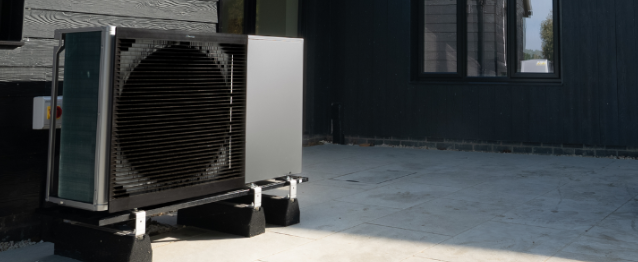How do Air Source Heat Pumps Compare to Alternatives?
Here is everything we discuss:
The main sources of heating
Most domestic properties in the UK rely on gas-powered boilers to heat their water and radiators. However, this is being phased out as the world moves away from fossil fuels.
So, what alternatives are available to you if you’re thinking about moving away from gas off at your home?
The current viable forms of heating are:
- Electric storage heaters
- Biomass heating
- Ground and water source heat pumps
- Air source heat pumps
Let’s look at these in some more detail.

Electric storage heaters
Electric storage heaters are more common in apartment buildings and houses built around the 1970s.
In theory, they’re a great way to heat your home because you can get electricity from renewable sources. You can also control them in a much more precise way than you can control, say, every radiator in your home. However, they are harder to control accuratley as they take so long to heat up.
The main downside to storage heaters is that they’re incredibly inefficient. Because they have to heat up heating elements which then release heat into your spaces, they need to use a lot of electricity to output that heat.
Electric storage heaters tend to be some of the least efficient (and therefore most expensive) ways to heat a home – especially when accounting for radiators and hot water.
Biomass heating
“Biomass” is promoted as another way of heating your home with a “renewable” resource, but that resource is essentially trees. Rather than logs on a roaring fire, biomass heaters use refined wood pellets to reduce the amount of soot that gets produced. By starting with drier wood, the pellets burn quickly and reach a high heat, so less heavy carbon (soot) gets emitted.
They create less emissions than gas or oil boilers, but they’re still burning a fuel and still create emissions. A lot of energy needs to be used to cut down the trees, dry them out, chip them, and turn them into pellets. So, while homeowners don’t have as many emissions at their boiler, it’s essentially passing the buck elsewhere.
Ground and water source heat pumps
Heat pumps are currently the only viable alternative to heating a home than gas or oil-powered systems, financially and from an environmental perspective. A better alternative may yet be developed but with a heat pump you get consistent, reliable and sustainable heat for your home and water.
Heat pumps don’t “generate” heat themselves but actually move heat from one place to another. We go into more detail about how they work and what types are available here but, essentially ground and water source heat pumps use a long loop of coolant to pull heat out of a source.
Ground source heat pumps usually have to have a really deep borehole drilled into the ground (sometimes as deep as 150m). They can be unsuitable for many geological locations, and water source heat pumps need to be near an aquifer to extract heat from them.
While these are seen as more “consistent” sources of energy, they’re much more costly to install and have quite a detrimental impact on their immediate environment.
Ground source boreholes, for example, can freeze the ground around them during cold weather (which renders them inoperable). If everyone tapped into the heat of underground aquifers, there’s no telling what the consequences would be for numerous ecosystems further down the line.
Air source heat pumps
Air source heat pumps maximise all energy benefits of heat pump technology without the detrimental environmental impacts. They’re actually as consistent (if not more consistent at times) than ground and water sources because they don’t have the possible problems of freezing their source.
Air source heat pumps are so effective, in fact, that they’re usually expected to work at between 300-400% efficiency when averaged over the year.
This means that you only need to use 2.5kWh of electricity for every 10kWh of heat produced. If you were relying on an average older gas boiler working at 75% efficiency, you’d have to use 12.5kWh of energy to get the same heat. So you’re saving a lot – which is great for the planet without having to make any sacrifices.

Are air source heat pumps more expensive?
The topic of “how expensive are heat pumps” is actually quite a sticky one – not because they’re significantly more expensive but because the cost varies so much. Costs are based on the efficiency of the system and the current unit prices available on your tariff. The difficulty is in giving figures that are almost immediately outdated.
If you’re curious, we go into great detail about heat pump installation and operation cost here. According to Energy Saving Trust data, however, an air source heat pump can provide significant savings on your energy bills compared to electric storage heaters or older inefficient boilers – and often comparable running costs to a brand-new high efficiency gas boiler.



